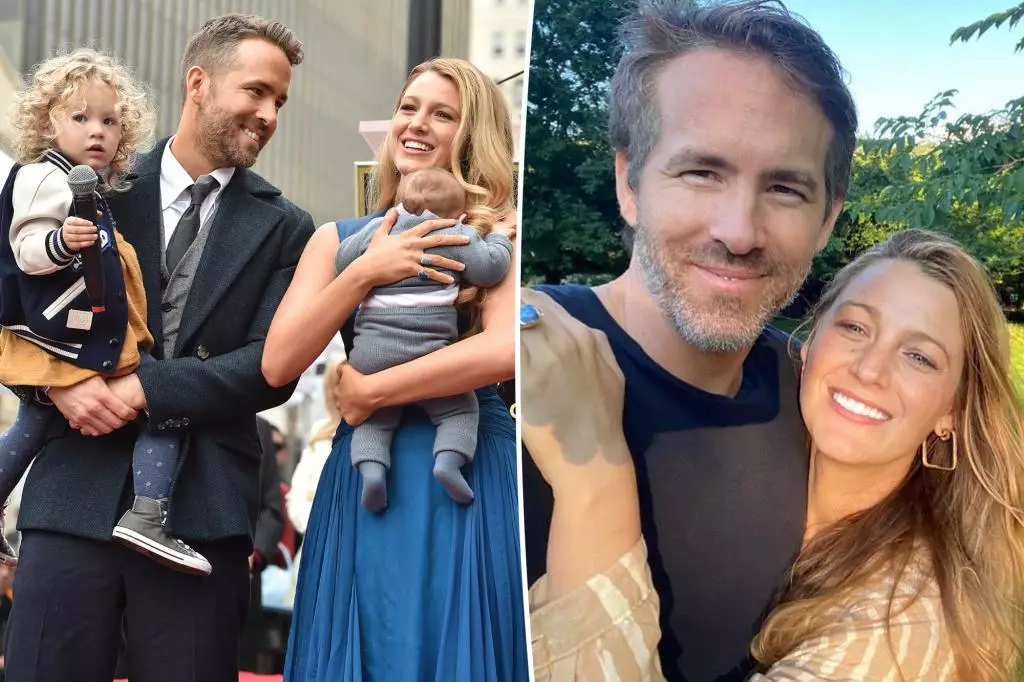Ryan Reynolds and Blake Lively have successfully established themselves as not just Hollywood A-listers but as dedicated parents navigating the complexities of raising their children in a privileged environment. As beloved figures both on and off the screen, they face unique challenges in parenting that stem from their wealth and fame. Their desire to provide a ‘normal’ upbringing for their four children presents a fascinating case for examining modern parenting among celebrities and the layers of responsibility that accompany privilege.
In a candid interview, Reynolds opened up about how he and Lively strive to shield their children from the stark contrasts between their own humble beginnings and the comfortable lifestyle they can now offer. Growing up in a working-class environment, Reynolds often reflects on the disparities between his childhood experiences and those of his children. He acknowledges the luxury of having things like takeout, luxuries he did not experience as a child. This realization highlights the common concern among affluent parents: how to raise children who appreciate their privileges without feeling entitled.
Reynolds emphasizes that he doesn’t want to burden his kids with the weight of his and Lively’s success. Instead, he seeks to instill a sense of gratitude and empathy within them. By consciously attempting to separate their children’s experiences from their own, Reynolds demonstrates an understanding that children should not carry the emotional baggage of their parents’ achievements or struggles. This approach reflects a broader trend among many modern parents who prioritize emotional intelligence and empathy over material concerns.
This emphasis on empathy is one of the pillars of Reynolds’ parenting philosophy. He believes that being able to understand and share the feelings of others is a crucial trait he and Lively are nurturing in their children. The couple wants their kids to grow into compassionate individuals, aware of those less fortunate and able to connect with diverse experiences. This value is particularly essential in today’s global society, where social media and celebrity culture can easily skew perceptions of reality.
Reynolds notes the importance of children being in tune with the world around them, expressing pride in how his children can empathize with others. After all, emotional intelligence is increasingly recognized as vital to a child’s development, aiding in forming healthy relationships and fostering a sense of community. In this aspect, Reynolds and Lively set a remarkable example for parents in similar positions.
In addition to navigating parenting styles, Reynolds also grapples with the challenge of managing his work-life balance. His passion for acting and entrepreneurship requires significant commitment, and he’s keenly aware of how this affects his ability to be present for his children. In interviews, he has candidly expressed his fears of missing important milestones and events in their lives.
The tension between professional obligations and personal life is a universal struggle that many working parents face, yet it is amplified in the context of a celebrity lifestyle. Reynolds admits that his work can “swallow [his] whole life,” which adds to the intensity of his desire to be an involved father. Recognizing this struggle illustrates a shared humanity that resonates with audiences, transcending the glitz and glamour of Hollywood.
Ultimately, Ryan Reynolds and Blake Lively’s journey through parenthood in the public eye sheds light on the evolving nature of parenting itself. Their commitment to normalcy, empathy, and familial presence serves as an admirable model. They navigate the complexities of an extraordinary life while grounding their children in core values that promote empathy and gratitude.
In a world increasingly focused on the visible aspects of wealth and success, the approach taken by Reynolds and Lively reminds us that substance and emotional depth are equally important. Their experiences underline an essential truth: that parenting is less about the privileges afforded by fame and wealth and more about the relationships and values fostered within a family unit. As their children grow, the blessings and burdens of their unique upbringing will shape a new generation that can carry forward these vital principles.

